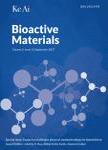Bacterial extracellular vesicle applications in cancer immunotherapy
作者机构:Department of BioengineeringCollege of EngineeringNortheastern UniversityBostonMA02115USA Department of Pharmaceutical SciencesSchool of PharmacyNortheastern UniversityBostonMA02115USA Massachusetts Eye and Ear InfirmaryHarvard Medical SchoolBostonMA20115USA Department of Chemical EngineeringCollege of EngineeringNortheastern UniversityBostonMA02115USA
出 版 物:《Bioactive Materials》 (生物活性材料(英文))
年 卷 期:2023年第22卷第4期
页 面:551-566页
核心收录:
学科分类:0831[工学-生物医学工程(可授工学、理学、医学学位)] 0710[理学-生物学] 1002[医学-临床医学] 0805[工学-材料科学与工程(可授工学、理学学位)] 100214[医学-肿瘤学] 0836[工学-生物工程] 10[医学]
主 题:Cancer immunotherapy Bacterial extracellular vesicles Membrane vesicles Outer membrane vesicles Mammalian extracellular vesicles
摘 要:Cancer therapy is undergoing a paradigm shift toward immunotherapy focusing on various approaches to activate the host immune *** research to identify appropriate immune cells and activate anti-tumor immunity continues to expand,scientists are looking at microbial sources given their inherent ability to elicit an immune *** extracellular vesicles(BEVs)are actively studied to control systemic humoral and cellular immune responses instead of using whole microorganisms or other types of extracellular vesicles(EVs).BEVs also provide the opportunity as versatile drug delivery *** mammalian EVs,BEVs have already made it to the clinic with the meningococcal vaccine(Bexsero®).However,there are still many unanswered questions in the use of BEVs,especially for chronic systemically administered *** this review,we address the opportunities and challenges in the use of BEVs for cancer immunotherapy and provide an outlook towards development of BEV products that can ultimately translate to the clinic.



